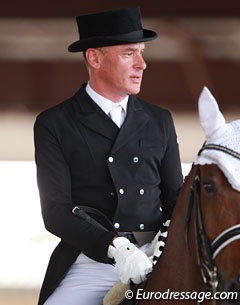
Our guest columnist of the week is German Grand Prix rider Michael Klimke, who is currently snowbirding and competing in Florida. Michael Klimke is a lawyer by profession with a big heart for dressage. One of the children of the late Dr. Reiner Klimke, he is a proponet of classical dressage training. Michael describes himself as a trainer and educator with a true passion for the correct training of the dressage horse. He wrote this open letter to the members of the International Dressage Trainers and Riders club and makes suggestions for the improvement of the sport.
Shorten the Grand Prix test, Endanger the Sport
Here in Wellington I heard that some members of the IDTC and the IDRC are really working and somehow supporting on a shorter Grand Prix Test. Being in the sport for a long time as a rider, trainer, show organizer and producer of Grand Prix horses I must say, it is the wrong way in our sport to shorten the Grand Prix.
Already the current Grand Prix is somehow a danger for the sport, because it is too short and without enough figures to ensure the submission and throughness of the horses; it is too much based on almost unnatural suspension and tension. The Grand Prix Special is still the best test, because it is almost unchanged since 30 years.
We have to stick to the classical or proofed principals of our sport, proofed and at least in the written guideline of the FEI. The Inter A and B are an example that we get, without any need, in trouble for training, because these tests are not bringing young horses to Grand Prix security, but add confusion in the training and showing these tests, leading (the sport) in the wrong direction
The arguments are as follows:
- 1. the numbers of spectators is higher than ever.
- 2. the interest of our sport is higher than ever: media, press and spectators at the shows, economy budgets in our sport etc...
- 3. the IOC is not (!!!!) forcing interests in the rules of dressage, but just give guidelines to the FEI as the body of equestrian sport for all equestrian disciplines. Do not believe those people that say that this is what the IOC wants. I know Dr Bach in person; he assured me years ago in saying that the IOC is not in detail enforcing any dressage rules, but just the number of horses in equestrian for all disciplines !
- 4. the shorter the Grand Prix test, the more only the quality of that movement makes the result and not the combination of quality of movements and the technically well ridden figures.
- 5. Please keep in mind that the biggest problem of our sport ist still the judging which is often political, personal, subjective and without any straight guideline and/nor understandable for media and spectators, of course neither for riders and trainers.
Why do the trainers and riders do not stand up against the current judging reality ? We cannot accept the differences in percentages any more, that is the biggest danger of our sport. I'm not speaking out against any judge in person, but why are we accepting judges that at many shows are simply not good enough, because they lack an understandable guideline or are out of order because of a high differences compared to the other judges ?
I want to make clear that I understand that judging is difficult and that all judges that I know try to do their best ! No judge in person should feel attacked; the reality of judging is my point, not any personal criticism.
We expect from riders good riding, from trainers good behaviour and the welfare to the horse in mind. Can we not expect at least from the judges? Objective judging and a straight, understanding guideline?
My proposals are:
Since a long time we discuss to scratch the highest and lowest judge, a supervisory panel, video proof, yellow and red cards for judges or other ideas. We only got the increase of number of judges of 5 to 7 which is more expensive for the riders and organizers, but less effective and objectice to our sport !
Why do we allow that more judges have so far made our sport even less understandable and more political ?
We have to go back to a maximum of five judges for championships and CDIO's, so that these judges find a straight line, at least until the freestyle. We do not want to go away of logical training, now by shortenung the Grand Prix instead of finding an objective guideline.
My proposal is very clear and easy: 5 judges at Championship and CDIO, no rotatation, a new Grand Prix of minimum 6.30 minutes which test and proove the principles of training, a card system for judges, and scratch the highest and the lowest score.
How can the IDTC and the IDRC get more influence in the FEI Dressage Committee so they can make good ideas turn into an FEI rule ? I wonder who within the FEI is listening to the IDTC and the IDRC, and not mainly to the judges and organizers of the shows?!
by Michael Klimke